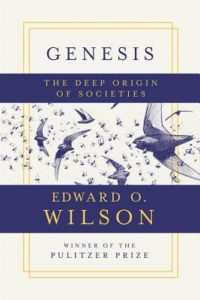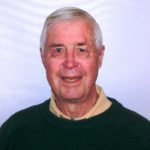 “What are we, what created us, and what do we wish ultimately to become?” Dr. Edward O. Wilson, the prolific emeritus professor at Harvard, biologist, and naturalist, is also a continual questioner. His last book, The Meaning of Human Existence (2014) also began with a question,“Who are we?”
“What are we, what created us, and what do we wish ultimately to become?” Dr. Edward O. Wilson, the prolific emeritus professor at Harvard, biologist, and naturalist, is also a continual questioner. His last book, The Meaning of Human Existence (2014) also began with a question,“Who are we?”
He begins with a restatement of what we have learned from our studies of human evolution: “Every part of the human body and mind has a physical base obedient to the laws of physics and chemistry. And all of it, so far as we can tell by continuous scientific examination, originated through evolution by natural selection.”
“The first organisms on earth,” he continues, “were self-assembled into replicating systems out of the endless random combinations of molecules present in the primordial sea.” We are the result of a series of “transitions” that evolved into “groups” and then “eusocial species” that began to practice altruism.”
Dr. Wilson then goes on to describe “eusociality,” a condition that has “arisen only rarely” as “colonies divided into reproductive and non-reproductive castes.” He cites, of course, insects (the subject of many of his earlier studies) with more than a million known species, of which some “twenty-thousand have been found to be eusocial” (ants, social bees, social wasps, and termites). Eusocial orders now appear to dominate the terrestrial animal world, and they are found within Homo sapiens: aged grandmothers, homosexuals, monastic orders.
As the author answers the question, “What was the force that made us?” he explicitly also asks, “What exactly replaced the gods?” And, “Why should people around the world continue to believe one fantasy over another out of the more than four thousand that exist on Earth?”
His answer: “tribalism,” a condition that appears to be slowly subsiding. But that is changing as humans expand and as the groups in which we gather enlarge: “the larger the group size, the more frequently innovations occur within the group. “Storytime” for humans has expanded from one to two hours a day to “five hours for modern humanity.”
But we are simultaneously both altruistic and selfish. How are we to work within these opposing traits? Wilson’s key suggestion of hope: “ … within groups, selfish individuals win against altruists, but groups of altruists beat groups of selfish individuals.”
One sidebar comment from this reader. Wilson uses that lovely word “murmurations,” as in the murmurations of starlings swooping, flying in coordinated patterns.
And I too now end with a question: What next?
Editor’s Note:

About the Author: Felix Kloman is a sailor, rower, husband, father, grandfather, retired management consultant and, above all, a curious reader and writer. He’s explored how we as human beings and organizations respond to ever-present uncertainty in two books, ‘Mumpsimus Revisited’ (2005) and ‘The Fantods of Risk’ (2008). A 20-year resident of Lyme, he now writes book reviews, mostly of non-fiction, which explores our minds, our behavior, our politics and our history. But he does throw in a novel here and there.
For more than 50 years, he’s put together the 17 syllables that comprise haiku, the traditional Japanese poetry, and now serves as the self-appointed “poet laureate” of Ashlawn Farm Coffee, where he may be seen on Friday mornings. His late wife, Ann, was also a writer, but of mystery novels, all of which begin in a village in midcoast Maine, strangely reminiscent of the town she and her husband visited every summer.